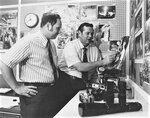
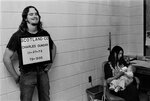
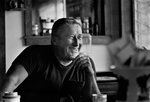
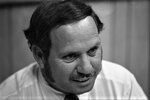
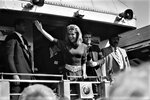
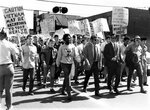
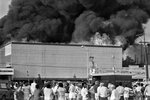
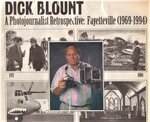
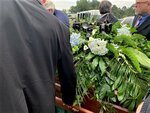

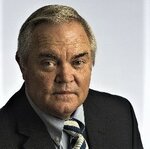
Dick Blount was one of the good guys to pass our way.
He was as down-to-earth as anyone could be.
He saw much of life through the camera’s lens, and there are countless photographs in The Fayetteville Observer photo archives that offer testimony to his work of 25 years at the newspaper office on Whitfield Street, and Hay Street before.
“He was the second full-time staff photographer hired at the paper,” retired newspaper chief photographer Johnny Horne can tell you about Dick Blount. “Bill Shaw had been there by himself since 1951.”
If you were a politician, a business executive, a high school athlete or a college or high school graduate in the late 1960s to the mid-1990s, it’s likely that your image is on a roll of film or the face of one of the thousands upon thousands upon thousands of photographs that Dick Blount snapped in his newspaper photography career from 1969 to 1994.
Newspaper photojournalists see it all — the homes that are left in a fire’s rubble; the mangled vehicle crashes that can take a motorist’s life; the trauma of crime; the civil unrest; and the hurricanes and tornadoes that can wreak havoc on a community.
Truth is, it wasn’t so much what Dick Blount was in life but what Dick Blount was not in life.
Never was he presumptuous.
Never was he arrogant.
Seldom was he without a kind word.
“Dick Blount loved people and the people he met,” the Rev. Eckie Lancaster would remind those who came Thursday to the Jernigan-Warren Funeral Home chapel for a last farewell. “How wonderful we would be in society if we could have that attitude that Dick Blount had.
“The Bible says be of good cheer. I don’t know when we started calling a funeral a celebration of life,” Lancaster would say. “But if ever a funeral is a celebration of life, it’s for Dick Blount. I would hope today we can share Dick’s love of other people.”
Lakedale proud
Dick Blount grew up in Lakedale in the Massey Hill community, playing in the sand beds with neighborhood kids. His father worked in the nearby cotton mill. His mother was a homemaker. Sundays were for worship at Victory United Methodist Church, where Theodore and Elizabeth Blount and their children seldom missed a service.
“He was born poor,” son Ted Blount would say. “But he loved his brother and sister and his many friends.”
And later, at age 19, Wynona Harding, the pretty girl with the smile who he would meet on a blind date, would win Dick Blount’s heart. They would elope to Dillion, South Carolina, in 1951.
“They had nothing,” Ted Blount would say. “You have to wonder how they made it.”
Dick Blount was drafted into the Army in 1952. He pulled a two-year hitch, moved to Myrtle Beach to work in an automobile service department, then back to Fayetteville, where he worked with the Fayetteville Public Works Commission before eventually moving on to The Fayetteville Observer as a photojournalist just off the second-floor newsroom along Hay Street.
Behind the camera
By 1973, the photography department would expand with The Fayetteville Times morning newspaper under the late Ken Cooke, with photojournalists that included Shaw, Blount, Johnny Horne, the late Steve Aldridge, later Cramer Gallimore and eventually Cindy Burnham. You found them everywhere, from shooting political campaign rallies to college football and basketball games to the Dr. Jeffrey MacDonald trial of the Army physician eventually convicted of murdering his wife and two young daughters on Feb. 17, 1970.
“Photography was a second career for Dick, starting in his late 30s,” Johnny Horne says. “He was 40 when I started working at the paper. He had little photographic experience prior to being hired at the Observer. Much of his development as a photographer came from watching other new staffers that were hired. I could see the progress he was making thanks to his paying attention to their pictures and talking with them. He took it upon himself to learn the craft and take it to a high level.”
Dick Blount, Horne says, had something else in his favor.
“What he didn’t need to develop was making the connection with people on his assignments and using that for some good access and resulting good pictures,” Horne says. “Reporters loved working with Dick because he would often know already people on their assignments.”
Horne’s words are not lost on Cindy Burnham, who joined the newspaper photography staff in 1980.
“I would always go to Dick when we would be photographing the who’s who of Fayetteville,” says Burnham, who retired in 2016. “He taught me how to gauge what an assignment would be like with those people. Dick was that mentor and part of learning how to understand the feature assignments in those guys. He was like a father figure to me. He was just a really nice guy. He was a sweetheart, and everybody loved him from the women’s garden clubs, and all the police officers liked him. Dick was the one who kind of made our photo staff feel like a family. And he gave the best hugs ever.”
And something else was in Dick Blount’s favor as a photojournalist.
“He was also good at maneuvering to get the picture,” Horne says, “even though authorities often had scenes cordoned off or traffic blocked.”
Whenever and wherever the story, you would find Dick Blount on the scene, cameras dangling around his neck. News reporters can put words to stories. A picture, however, is worth a thousand words.
“Many folks don’t know this about Dick, but he always had a sympathetic spot for the little guy he encountered on assignments,” Horne says. “I recall late in his career he returned to the office complaining about the arrest of a young female protester and how a city cop arrested her for no reason at all. Dick, perhaps more than anyone I ever worked with, had a disdain for abuse of authority.”
Dick Blount was an old-school photojournalist, and a photojournalist is on call no matter the hour.
“Dick was always ready to head out on any assignment,” Horne says. “He grew up working hard and that continued when he was at the newspaper. He retired around the time that photography was changing, moving from film to digital. That was probably a good time to retire, given that the whole workflow changed. Not long after retiring, though, he got himself a digital camera and moved seamlessly to making digital images.”
Dick Blount retired to White Lake, helping his sons in their business ventures, enjoying his grandchildren and great-grandchildren, and spending time with the wife he cherished for 72 years without fail.
“Mama and Daddy looked after each other,” son Tim Blount would say. “If we would go off somewhere, he would say, ‘I gotta get back to Wynona.’ I hope in my later years my wife, Tammy, and I will have that same magic. He loved her.”
Goldston Womble has been White Lake mayor for 38 years.
“He was a strong advocate for White Lake,” Womble says. “He thought a lot of White Lake and always enjoyed being here. Dick was a well-liked fellow. I like to think of him as one of White Lake’s ambassadors. We certainly will miss Dick.”
Jan. 5, 1932-May 21, 2023
Theodore Blake “Dick” Blount Jr. died May 21 at the N.C. State Veterans Nursing Home.
He was 91.
Dick Blount’s camera adorned the spray on his coffin Thursday as family and friends and old newspaper colleagues from former Observer managing editor Bob Wilson, former general manager Tony Chavonne, and photojournalists including Cindy Burnham, Swayne Hall and Johnny Horne came to pay final respects.
“Dick was certainly an excellent photo guy as a member of the Observer-Times staff and always added a great sense of humor,” says Wilson, who began his career at the newspaper in 1958 and was managing editor of the Observer from 1976 until retiring in 1989.
Dick Blount, you see, once was one of them, and they always will be a part of him.
Epilogue
“Be with all the saints of glory,” the Rev. Lancaster would say, “as they welcome him and say, ‘Well done, good and faithful servant.’”
Johnny Horne would stand near Dick Blount’s coffin at Lafayette Memorial Park. He could see in his mind’s eye the photographs that carried his old friend’s stamps — the fires, the Vietnam protests, the Christmas parades and the crime scene photographs, too.
“I can’t think of any person who jumped into photography at a later time in their life,” Johnny Horne later would say, “that contributed so much to the newspaper.”
Bill Kirby Jr. can be reached at billkirby49@gmail.com or 910-624-1961.